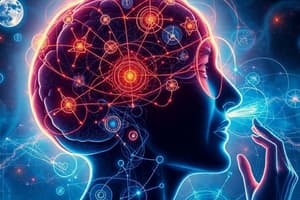Podcast
Questions and Answers
What does the Germ Theory propose?
What does the Germ Theory propose?
- Specific microscopic organisms cause specific diseases. (correct)
- All microorganisms are harmful to human health.
- Specific diseases are caused by genetic mutations.
- Viruses are the only pathogens responsible for diseases.
What does the Ideal Gas Law describe?
What does the Ideal Gas Law describe?
- The relationship between pressure, volume, and temperature of a gas. (correct)
- The behavior of gases at very low pressures.
- The volume of gases in relation to solid matter.
- How gases react with liquids in chemical reactions.
Which statement characterizes scientific laws?
Which statement characterizes scientific laws?
- They can change with new experimental evidence.
- They explain why phenomena occur.
- They are always presented in mathematical formulas.
- They are descriptions of relationships among observable phenomena. (correct)
What is a common human error relating to science known as cognitive dissonance?
What is a common human error relating to science known as cognitive dissonance?
How is a theory different from a scientific law?
How is a theory different from a scientific law?
What characterizes pseudoscience?
What characterizes pseudoscience?
What does the term 'Collision Theory' in chemistry indicate?
What does the term 'Collision Theory' in chemistry indicate?
What effect does confirmation bias have on scientific inquiry?
What effect does confirmation bias have on scientific inquiry?
What does the 'C' in CONPTTF stand for?
What does the 'C' in CONPTTF stand for?
Which characteristic distinguishes a scientific theory from everyday use of the word?
Which characteristic distinguishes a scientific theory from everyday use of the word?
What best defines an observation in a scientific context?
What best defines an observation in a scientific context?
What does the 'F' in CONPTTF indicate regarding scientific claims?
What does the 'F' in CONPTTF indicate regarding scientific claims?
How should pseudoscience be characterized compared to true science?
How should pseudoscience be characterized compared to true science?
What is required for an observation to be considered a fact?
What is required for an observation to be considered a fact?
Which of the following best describes a hypothesis?
Which of the following best describes a hypothesis?
Which of the following is an example of a scientific theory?
Which of the following is an example of a scientific theory?
Flashcards are hidden until you start studying
Study Notes
What is Science?
- Science is a systematic enterprise that builds and organizes knowledge in the form of testable explanations and predictions about the universe.
- The foundation of scientific inquiry is characterized by the acronym CONPTTF: Consistent, Objective, Natural, Predictable, Testable, Tentative, Falsifiable.
Difference between Observation and Fact
- Observation: The act of watching or perceiving something; can be subjective and lacks inherent knowledge until interpreted.
- Fact: A verified observation accepted as true based on repeated confirmation.
Scientific Theories vs. Everyday Theories
- Scientific theories provide well-substantiated explanations of natural phenomena, supported by extensive evidence, enabling predictions.
- Theories answer the question "why," while hypotheses are preliminary testable predictions.
- Examples:
- Cell Theory: All living organisms consist of cells.
- Germ Theory: Microscopic organisms cause diseases.
- Atomic Theory: Matter is made of atoms.
Scientific Laws
- Laws describe consistent relationships among observable phenomena and summarize how aspects of the natural world behave under specific conditions.
- Laws reflect what occurs rather than why.
- Examples:
- Ideal Gas Law: Describes the relationship between pressure, volume, and temperature of gases.
- Newton's Laws of Motion: Fundamental principles of dynamics, such as F=ma.
Key Differences: Law, Theory, Fact, Hypothesis
- Fact: Confirmed observation.
- Law: Descriptive formula based on repeated observations.
- Theory: Comprehensive explanation of phenomena.
- Hypothesis: Initial testable statement that predicts outcomes.
Cognitive Dissonance in Science
- Cognitive dissonance refers to conflicting beliefs and actions leading to mental discomfort, often resulting in denial or rationalization of contrary evidence.
Confirmation Bias
- The tendency to focus on information that supports pre-existing beliefs, leading to skewed data interpretation and memory.
Dunning-Kruger Effect
- A cognitive bias where individuals with limited knowledge overestimate their competence in a subject, contrasting with their actual performance.
What is Pseudoscience?
- Pseudoscience refers to claims or practices that assert to be scientific but lack adherence to the scientific method and cannot be reliably tested or falsified.
Studying That Suits You
Use AI to generate personalized quizzes and flashcards to suit your learning preferences.




